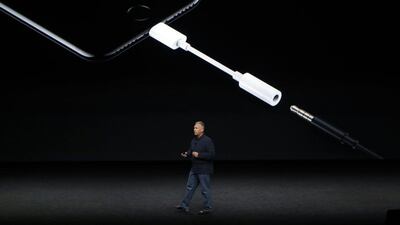While it would be foolish to say that the iPhone 7 is a make-it-or-break-it product for Apple, there is a lot riding on it.
After two successive quarters of sales declines, the first in the product’s history, Apple needs to right the ship in a bad way. With the iPhone generating more than half of its revenue and profit and with no obvious big new products in the pipeline, the company can ill afford a continuing downward trend.
Unfortunately, it doesn’t look like the iPhone 7 is going to set things right. Unveiled at a press event in San Francisco on Wednesday, the iPhone 7 and its larger iPhone 7 Plus cousin are iterative additions to the lineup at best and potentially off-putting to consumers at worst.
The new devices, available from September 17 in 28 countries including the UAE, pack the expected incremental improvements in processor speed, battery life and storage space, but they’re light on new whiz-bang features.
A redesigned home button replaces the need to click with “taptic” feedback while an improved camera promises better pictures. The best new feature, a second telephoto lens that will enable true optic zoom, is available only on the bigger and more expensive iPhone 7 Plus.
The new devices are also water and dust-resistant and finally have stereo speakers, but none of the additions are what anyone would call groundbreaking or must-have.
On the other hand, Apple’s other big move – the decision to eliminate the iPhone’s 35-millimetre headphone jack in favour of connecting earphones either wirelessly or through its Lightning port – is drawing hostility and could turn potential buyers off.
Critics are questioning why the company is replacing a decades-old standard that works just fine with a proprietary measure that offers no discernible benefits. If consumers want to use existing earphones and audio accessories with the iPhone 7, they’ll need an inelegant adapter or have to repurchase all those devices in the new, compatible format.
Apple didn’t do itself any favours in its justification on Wednesday, with head of marketing Phil Schiller saying it was merely motivated by “the courage to move on to do something that betters all of us”. There was a collective virtual eye-roll among people following the event on Twitter.
Apple’s new wireless earphones, dubbed AirPods, are also provoking derision. The US$169 earphones, which resemble miniature hair dryers, are taking fire for being expensive, silly looking when worn, and likely prone to getting lost on account of their small size and – ironically – their lack of a cord.
Nevertheless, Apple could experience a sales rebound with the iPhone 7 thanks to some good timing.
The company had record sales two years ago when it launched the iPhone 6 and 6 Plus, mainly thanks to the devices’ larger screen sizes. The duo were the first to stretch beyond four inches, which was enough to tap into the demand built by steady growth in the size of competing Android phones.
With wireless carriers in many countries typically subsidising the upfront cost of new smartphones in exchange for two-year contracts, a large cohort of iPhone 6 customers will now be coming up for renewal.
Many are therefore already in the mindset to consider upgrading to something new. The question is how many of them will find enough appeal in the iPhone 7 to do so.
Given that, it’s a safe bet that this year’s iPhone will do better than last year’s, but probably not as well as the iPhone 6 two years ago.
In some ways, Apple could end up a victim of its own success. The iPhone is a lot like a Toyota car in that it retains its value over time and keeps working longer than many of its rivals. That good-enough longevity might convince buyers to sit out the iPhone 7 and wait for the next one.
And the next one, next year, will mark the 10th anniversary of the iPhone. Many analysts are expecting Apple to pull out something big for the occasion, which is yet another reason why consumers may decide to skip the iPhone 7.
Peter Nowak is a veteran technology writer and the author of Humans 3.0: The Upgrading of the Species.
business@thenational.ae
Follow The National's Business section on Twitter

